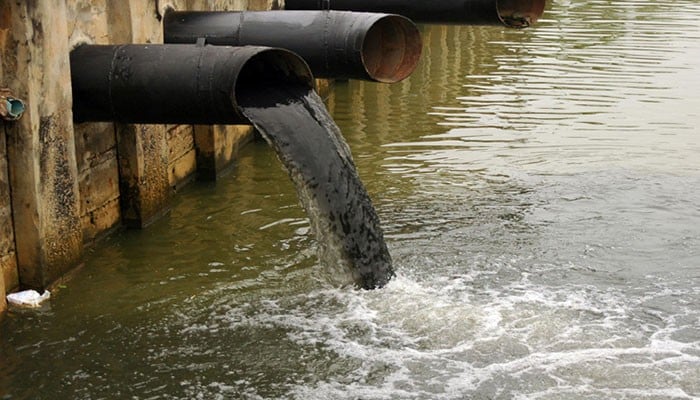Provision of clean drinking water responsibility of Sindh govt: Chief Justice
December 23, 2017
KARACHI: Chief Justice of Pakistan, Justice Saqib Nisar remarked on Saturday that the provision of clean drinking water is the responsibility of Sindh government, while hearing the water pollution case at the Karachi registry today.
A four-member Supreme Court bench under Chief Justice Saqib Nisar is hearing the case.
The chief justice observed that Sindh Chief Minister Murad Ali Shah was summoned to the court to give a timeframe for resolving the water pollution crisis in the province.
"Contaminated water is being put in the rivers and lake, which is later provided to the people for consumption," the chief justice remarked. "We have raised the water pollution issue in Punjab as well, we will get it resolved."
Justice Nisar added that he holds the chief minister of the province and his cabinet responsible for the provision of clean drinking water to the province.
The chief justice further said that due to the consumption of contaminated water, citizens are facing acute diseases, including hepatitis.
He questioned the Sindh Advocate General regarding what action had the provincial government taken against the water tanker mafia, adding that the court reserves the option to issue 'contempt of the court' notice.
"Court wants a time frame on oath. We should be told what actions the Sindh government has taken from December 5," he said.
He further added that the hearing of the case will cntinue till midnight if needed as he would want the issue to be resolved.
The chief justice told Sindh Chief Secretary that the water pollution issue must be resolved before next general elections. He also observed that as much as 45mgd of contaminated water is being put in the sea on daily basis.
Questioning in regards to the measures taken against the tanker mafia in Karachi, the chief justice was informed that tankers in the metropolis supply around 13 million gallons of water per annum to the citizenry.
The court for Saturday's hearing has summoned details of the PC-1 of the industrial treatment plan from the Sindh government and instructed Sindh's AG to submit a report on the same in the next hearing.
Referring to his earlier visit to Mayo Hospital, Justice Nisar remarked that he visited the establishment to safeguard lives of the citizens as it is mentioned in the Constitution that the judiciary is also responsible for the provision of basic services to the people.
Suo moto notice of Sindh hospitals
During the hearing, the chief justice took suo moto notice of the medical facilities and government-run hospitals of Sindh.
Justice Nisar asked how many medical colleges of the province have 500-bed hospitals near them and also if the hospitals operating in the province were associated with the Pakistan Medical and Dental Association.
Remarking that there are doctors in government-run hospitals of Sindh who do not even know how to check the blood pressure of patients, the chief justice said he will visit the interior of the province and observe the current standards of healthcare facilities.
In the case's earlier hearing, Chief Justice Saqib Nisar observed that human waste is being deliberately released in water being used by the residents of Sindh.
The remarks of the chief justice came after a short-film about contaminated water was shown in the courtroom.
Sindh Chief Minister Murad Ali Shah and former Karachi mayor Mustafa Kamal were also present at the Karachi registry to appear before the bench hearing the case.
During the hearing, Chief Justice Nisar remarked that the water situation in Sindh is troublesome, adding that the chief minister has been summoned so they can resolve the situation together. The chief justice stressed it was the responsibility of the government to provide clean water to residents.
"If you say, we both can go drink and check the quality of water from any stream in Mithi," Chief Justice Nisar remarked.
Justice Nisar added: "I wish [PPP leader] Bilawal Bhutto Zardari knew of the [water] situation in Larkana".
He further asked the chief minister to rid Karachi populace of water tankers, adding that it was his (CM Shah's) responsibility to provide the citizens with clean water.
The chief justice further said they would not interfere in the administrative affairs, however, they would also not allow anyone, be it the chief minister or the prime minister, to act against the constitution.
"Even if we have to come to Karachi every week and summon you, we would do that," he told CM Shah.
'Situation not as dire'
Sindh Cheif Minister Murad Ali Shah informed the bench hearing the case that the water crisis is not as extreme as shown by the petitioner, adding that "if I get an opportunity I will show my video to the court".
He was referring to a short video by petitioner Shahab Usto which was shown earlier in court through a projector.
The chief minister said that the provincial government is working to resolve the issue, however, it is facing a shortage of funds.
Shah claimed that 100 per cent water supplied to Lahore, 73 per cent in Sheikhupura and 88 per cent in Sargodha is arsenic, adding that the court proceedings appear to only single-out Sindh.













